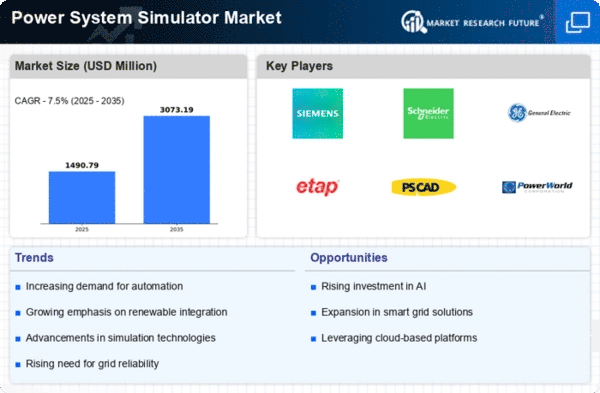Top Industry Leaders in the Power System Simulator Market

*Disclaimer: List of key companies in no particular order
Latest Company Updates:
Strategies in Play:
Specialization and Focus: Established players like Siemens PSS/E, GE PSLF, and DNV GL PowerFactory are leveraging their vast experience and brand recognition to cater to specific segments like transmission and distribution or renewable energy integration. Meanwhile, niche players like Powersim and RTsoft are carving out a space by offering cost-effective solutions for smaller utilities and microgrids.
Innovation and Differentiation: Continuously enhancing simulator capabilities through advanced features like real-time data integration, cyber security modules, and AI-powered optimization algorithms is a top priority. Examples include DNV GL's Grid*Lab with its focus on distributed energy resources and Powersim's focus on cloud-based platforms.
Partnerships and Acquisitions: Strategic collaborations and acquisitions are facilitating expansion and access to new markets. Siemens' acquisition of PTI, for instance, strengthened its position in North America, while GE's partnership with ePRI enables them to offer advanced grid analytics solutions.
Subscription and Service Models: Recognizing the shift towards cloud-based solutions, players are transitioning from traditional perpetual licenses to subscription-based models, offering greater flexibility and affordability for customers. Additionally, comprehensive training and support services are becoming a key differentiator in attracting and retaining clients.
Factors for Market Share Analysis:
Product Portfolio Breadth and Depth: The ability to offer solutions for diverse applications, from steady-state analysis to transient stability studies, plays a crucial role in attracting a wider customer base.
Technological Superiority: Continuous investment in R&D to develop cutting-edge features and integrate advanced technologies like AI and cloud computing is essential for staying ahead of the curve.
Global Reach and Market Penetration: Established presence in key geographies across the globe, particularly in developing markets with rapid infrastructure expansion, provides a clear advantage.
Brand Reputation and Customer Trust: A strong track record of successful projects, coupled with excellent customer support and service, fosters trust and loyalty, leading to repeat business and positive word-of-mouth referrals.
New and Emerging Trends:
Cloud-based Simulation Platforms: The shift towards cloud-based solutions offering increased accessibility, scalability, and cost-effectiveness is transforming the market. Players like Powersim and eGrid are leading the charge in this space.
Integration of Big Data and AI: Leveraging big data analytics and AI for predictive maintenance, fault detection, and optimized grid operations is gaining traction. Advanced solutions like Siemens' Empirion and GE's Predix platform are paving the way for intelligent grid management.
Cybersecurity Focus: With increasing cyber threats targeting critical infrastructure, robust cybersecurity features and protocols are becoming an essential requirement for power system simulators.
Overall Competitive Scenario:
The power system simulator market is characterized by intense competition with a mix of established players and emerging disruptors. While traditional giants hold a significant market share, niche players and innovative startups are offering specialized solutions and cloud-based alternatives, challenging the status quo. The market is expected to witness further consolidation through strategic partnerships and acquisitions as players seek to expand their reach and product offerings. The ability to continuously adapt to evolving customer needs, integrate cutting-edge technologies, and offer flexible and cost-effective solutions will be key for success in this dynamic and growing market.
ABB (Switzerland):
• Launched the MicroSCADA Platform 2023 in June 2023, featuring enhanced cyber security, grid visibility, and advanced analytics capabilities.
Schneider Electric (France):
• Acquired EcoStruxure Grid in April 2023, a leading provider of power system simulation and analysis software.
Eaton (Ireland):
• Released Cybersecurity Advisor 2023 in September 2023, a software tool that helps utilities assess and mitigate cyber risks in their power systems.
Siemens (Germany):
• Launched the Siemens PSS® SINCAL 2024 in December 2023, the latest version of its flagship power system simulation software.
GE (US):
• Released the GE Power Grid Optimization Platform 2023 in July 2023, featuring new features for renewable energy integration and grid resilience.
Top listed global companies in the industry are:
ABB (Switzerland)
Schneider Electric (France)
Eaton (Ireland)
Siemens (Germany)
GE (US)
ETAP (US)
Open Systems International, Inc. (US)
The MathWorks, Inc. (US)
Opal-RT Technologies, Inc. (Canada)
PowerWorld Corporation (US)
Neplan AG (Switzerland)
RTDS Technologies Inc. (Canada)
Energy Exemplar (Australia)
Fuji Electric (Japan)
Atos SE (France)










